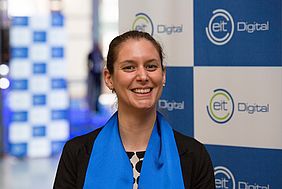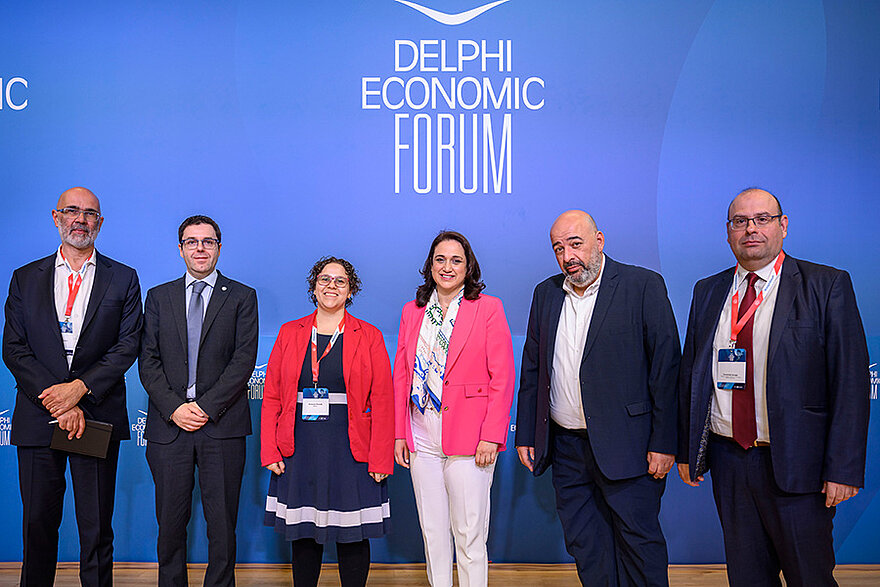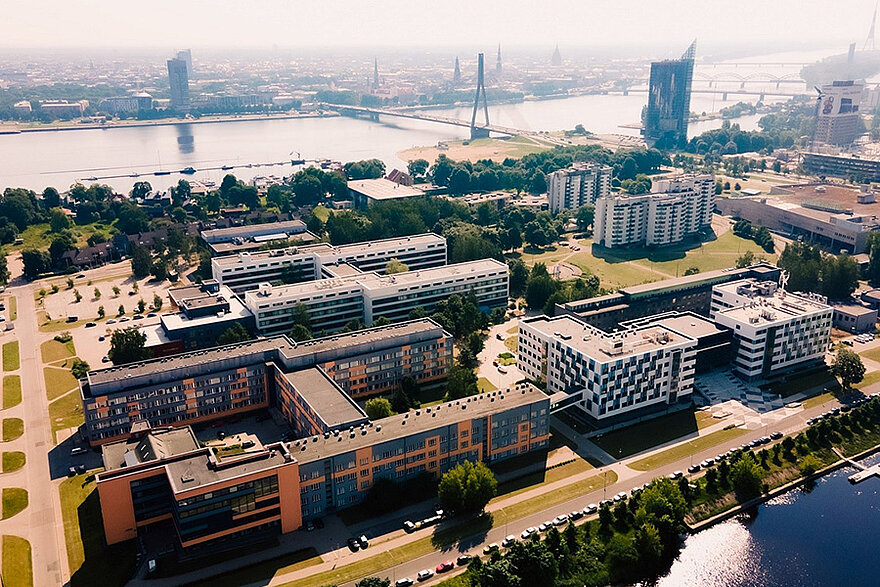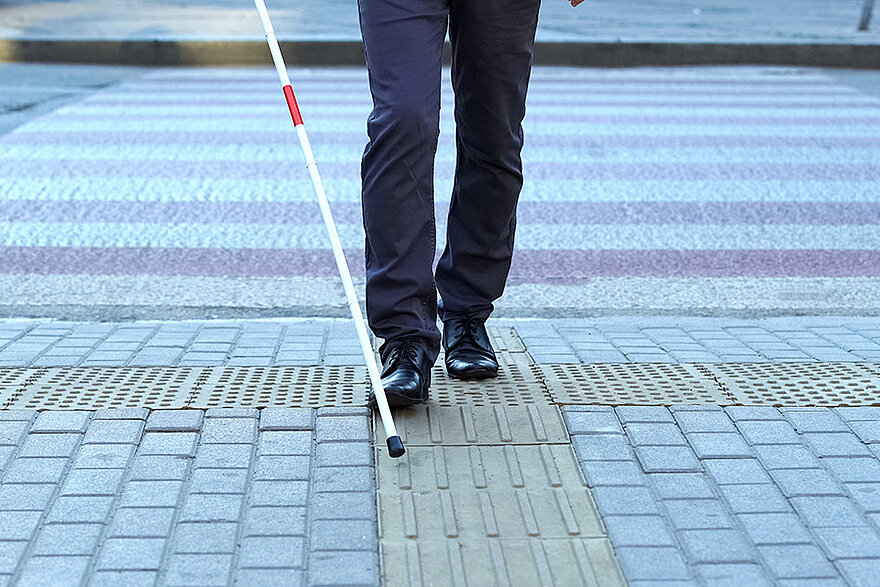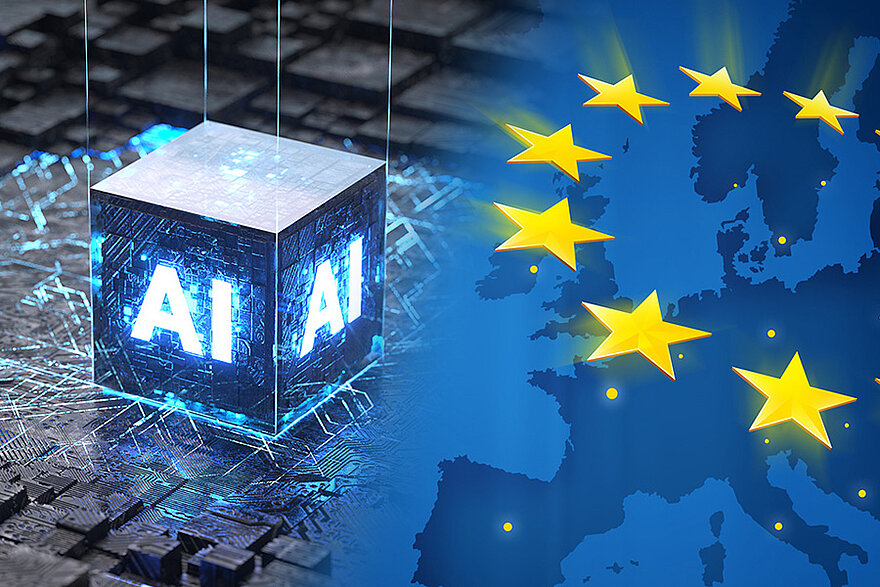"Now I have a PhD in Computer Science!"
Teresa Macchia (31) graduated from the EIT Digital Doctoral School in March 2017. Having a PhD in Computer Science is quite a special achievement for her, because previously she didn't have a technical education. Now her non-technical background is helping her with her life's ambition: Bringing the right balance between technology and humans. This is reflected in her thesis about a cyborg ecology approach, smart cities, and the Internet of Things industry in Europe.
Macchia heard about the EIT Digital Doctoral School while she was studying in Trento and was immediately enthused; particularly by the combined academic and entrepreneurial approach and the chance to be part of an international network. One problem: in order to get into the EIT Digital Doctoral School, one needs at least a background in computer science. Macchia didn't have that. Instead, she holds a bachelor's degree in sociology from the University of Trento and a Master in Arts about Work, Organisations and Information Systems. At high school she specialised in Architecture.
PHD in Computer Science
Yet, she had set her sights on the EIT Digital Doctoral School. "I can do it", she encouraged herself. She started to study on her own, borrowing books from professors and when she had read them all through, she applied for an open scholarship and got admitted in December 2012. In March 2017, she showed off her diploma with pride to the photographer at the graduation ceremony in Brussels. "Now I have also a PhD in Computer Science!"
Though definitely worthwhile, the EIT Digital Doctoral School is 'demanding', says the Italian. "I do have some grey hairs now". The concept is that you do a PhD, in her case at the University of Trento, and on top of that you have to complete the EIT Digital Doctoral School Programme. "That is tough, but at the same time it's a plus. You get to travel and meet people all over Europe. In the end, you learn how to become responsible for making a difference in your life and in the lives of others."
LPWAN technology
Via the <link about-us locations london-node>London EIT Digital office, Macchia got in touch with Irene Lopez de Vallejo, Director of Research and Development at EIT Digital partner Digital Catapult for an internship. At this company, she carried out research for an innovation programme called "Things Connected". This programme aims at boosting low power wide area networks (LPWAN). "This kind of network technology comes in handy for devices that do not need to communicate continuously; it is more sustainable and less expensive. Some companies are really working to move towards this kind of technology, even if it is not ready yet. In France and the Netherlands, this kind of network is already up and running. In the UK, it is starting to grow now."
The PhD finds that there is a strong need for LPWAN technology to enable new technology. One of her jobs was to map the needs of small companies - startups, scaleups - and larger companies. That taught her that these companies should work together in developing technology for modern cities. She also discovered that innovation is not always about the money. "It is also about the ecosystem and finding ways to improve it. Innovation and changes are more likely to occur when different people work together and make human technology valuable."
Cyborgs
This is where the concept of cyborgs becomes significant. A cyborg combines, explains the researcher, as well as human as technological aspects. She believes that we are heading towards a future where these aspects synergise. "That is good. But we need to understand what the right balance would be. Cities should rethink how they are serving their people. It is about how we want to mediate between lifestyle and technology. If cities can get the balance between lifestyle and technology right, it offers many opportunities for making the lives of people easier. We won't be wasting time anymore on finding parking places for our cars, the ultimate vehicle will do this for us. Our lives will be easier and less stressful."
Variety of Technology
Macchia is most interested in how Internet of Things (IoT) technologies can promote inclusivity. "The challenge is to identify new questions to bring the design of IoT-technology towards a new spectrum of innovation and inclusiveness. You need to know how to use the technologies to create an empowering and inclusive environment. To empower the environment, we need to design and develop technology that meets actual needs and improves the user's experience."
To illustrate, she gives "a great example" of a Spanish project called COSMOS that exploits IoT-data and -services in Madrid's public transport system. In this project, the bus monitoring service was extended as a surveillance service for people with special needs. Typical, traditional services were converted into a new wave of enabling services. People with special needs and their careers are provided with accurate information to select the most appropriate itinerary. "This shows how existing services can be recombined and customised to support citizens."
Things Connected
Macchia is still in charge of the innovation programme she started in her internship. She continues to work on her thesis findings, but now Digital Catapult has hired her post PhD as an Experimental Researcher on Internet of Things. The programme Things Connected is up and running. "We support 20 SMEs, startups and scaleups, to develop products with the LPWAN technology and commercialise them. We offer them several facilities, like a network to test their product and we organise meetups. In that way, we want to create a community of peers to solve platform problems."
Products of the companies within this innovation programme include water sensors to measure legionella, sensors in bikes that produce more light when a car is approaching, apps that measure air pollution in the city streets, and sensors for children to monitor plants.
Go for it
Her work is about architecting, cities, sociology and technology. It seems that all the disciplines Macchia studied for, come together in her current job. With the technical and entrepreneurial knowledge acquired through her PhD in Computer Science, she can really make it happen. The Italian hopes that her educational journey sends out a message to younger generations. "I want everybody to try to live up to their dreams and not to be scared to take chances. If you're interested in something and you think it is good for you and your society, then go for it."
